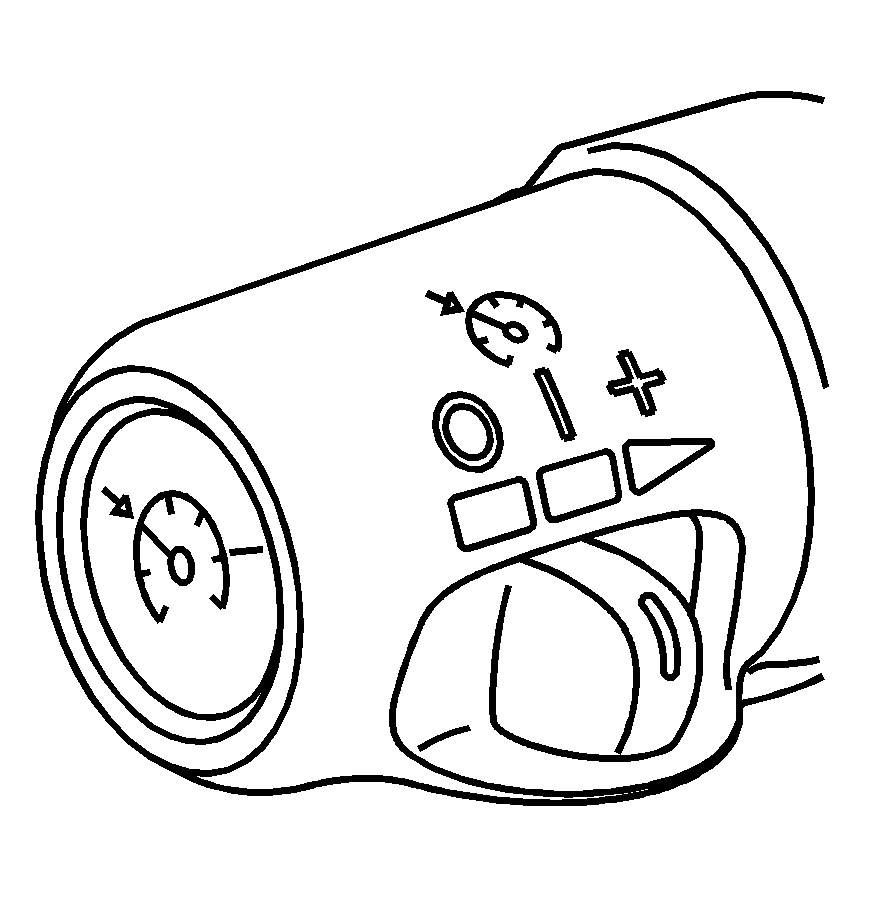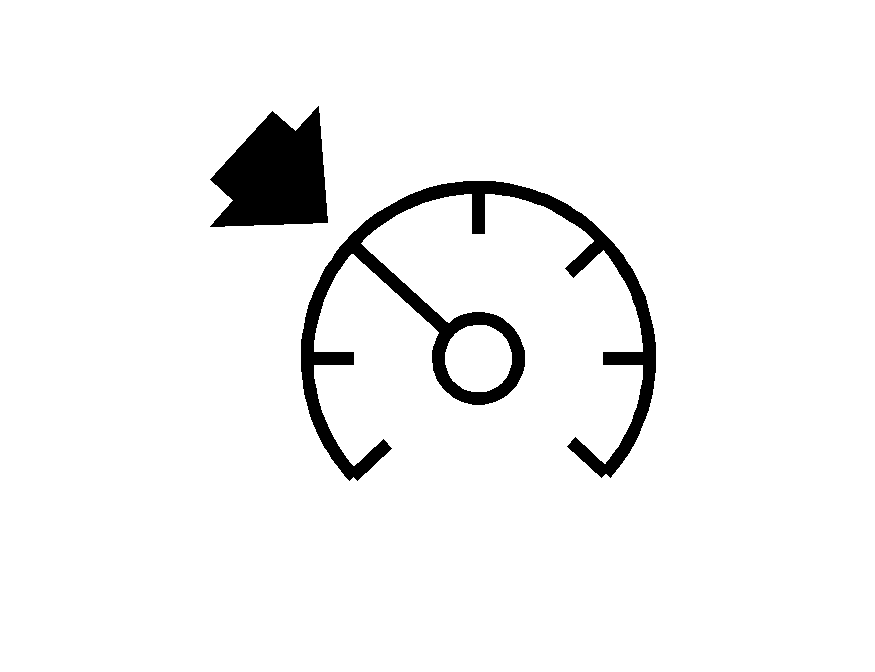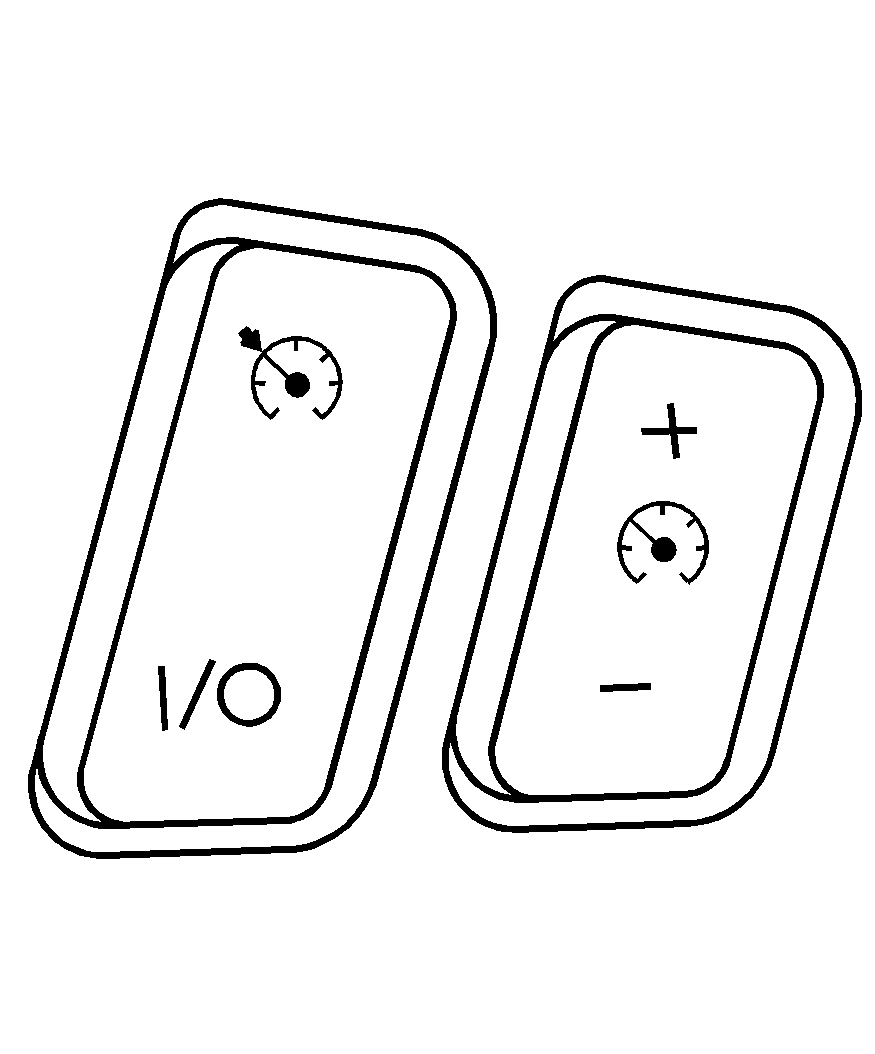Cruise Control CTS
If you have a CTS-V, see the next cruise control section.

These controls are located on the end of the multifunction lever.
(Off): This position turns the system off.(On): This position turns the system on.
+ (Resume/Accelerate): Push the lever to this symbol to make the vehicle resume to a previously set speed or to accelerate when cruise is already active.
(Set/Decrease): Press this button to set the speed or to decrease the speed when cruise is already active.
With cruise control, you can maintain a speed of about 25 mph (40 km/h) or more without keeping your foot on the accelerator. This can really help on long trips. Cruise control does not work at speeds below about 25 mph (40 km/h).
If you apply your brakes, the cruise control will shut off.
Caution: Cruise control can be dangerous where you cannot drive safely at a steady speed. So, do not use the cruise control on winding roads or in heavy traffic.
Cruise control can be dangerous on slippery roads. On such roads, fast changes in tire traction can cause excessive wheel slip, and you could lose control. Do not use cruise control on slippery roads.If your vehicle is in cruise control when the traction control system begins to limit wheel spin, the cruise control will automatically disengage. See Traction Control System (TCS) and StabiliTrak® System . When road conditions allow you to safely use it again, you may turn the cruise control back on.
Setting Cruise Control
Caution: If you leave your cruise control on when you are not using cruise, you might hit a button and go into cruise when you do not want to. You could be startled and even lose control. Keep the cruise control switch off until you want to use cruise control.
- Move the cruise control switch to on.
- Get up to the speed you want.
- Press in the set button at the end of the lever and release it.
- Take your foot off the accelerator pedal.

This light on the instrument panel cluster will come on while cruise control is on.
Resuming a Set Speed
Suppose you set your cruise control at a desired speed and then you apply the brake. This, of course, disengages the cruise control. But you don't need to reset it.
Once you're going about 25 mph (40 km/h) or more, you can move the cruise control switch briefly from on to resume/accelerate.
You'll go right back up to your chosen speed and stay there.
If you hold the switch at resume/accelerate the vehicle will keep going faster until you release the switch or apply the brake. So unless you want to go faster, don't hold the switch at resume/accelerate.
Increasing Speed While Using Cruise Control
There are two ways to go to a higher speed:
| • | Use the accelerator pedal to get to the higher speed. Press the set button at the end of the lever, then release the button and the accelerator pedal. You'll now cruise at the higher speed. |
| • | Move the cruise switch from on to resume/accelerate. Hold it there until you get up to the speed you want, and then release the switch. To increase your speed in very small amounts, move the switch briefly to resume/accelerate. Each time you do this, your vehicle will go about 1 mph (1.6 km/h) faster. |
If using the accelerator pedal and the set button at end of the lever to increase cruise set speed, your new set speed must be at least 10 mph higher than current speed for this method to work. If it is not 10 mph higher, switch cruise switch off, then on, and then reset your speed using the set button.
Reducing Speed While Using Cruise Control
There are two ways to reduce your speed while using cruise control:
| • | Press in the button at the end of the lever until you reach the lower speed you want, then release it. |
| • | To slow down in very small amounts, briefly press the set button. Each time you do this, you'll go about 1 mph (1.6 km/h) slower. |
Passing Another Vehicle While Using Cruise Control
Use the accelerator pedal to increase your speed. When you take your foot off the pedal, your vehicle will slow down to the cruise control speed you set earlier.
Using Cruise Control on Hills
How well your cruise control will work on hills depends upon your speed, load and the steepness of the hills. When going up steep hills, you may have to step on the accelerator pedal to maintain your speed. When going downhill, you may have to brake or shift to a lower gear to keep your speed down. Applying the brake or shifting into a lower gear will take you out of cruise control. If you need to apply the brake or shift to a lower gear due to the grade of the downhill slope, you may not want to attempt to use your cruise control feature.
Ending Cruise Control
To end a cruise control session, step lightly on the brake pedal. If your vehicle has a manual transmission, lightly tapping the clutch will end a cruise control session also.
Stepping on the brake or clutch pedal will end the current cruise control session only. Move the cruise control switch to off to turn off the system completely.
Erasing Speed Memory
When you turn off the cruise control or the ignition, your cruise control set speed memory is erased.
Cruise Control CTS-V
If you have a CTS-V, you will have these cruise controls.

/: On/Off
: Set
+: Resume/Accelerate
-: Coast/Decelerate
The buttons used to operate cruise control are located on the right spoke of the steering wheel.
With cruise control, you can maintain a speed of approximately 25 mph (40 km/h) or more without keeping your foot on the accelerator. This is helpful on long trips. Cruise control does not work at speeds below about 25 mph (40 km/h).
When you apply your brakes, the cruise control shuts off.
Caution: Cruise control can be dangerous where you cannot drive safely at a steady speed. So, do not use the cruise control on winding roads or in heavy traffic.
Cruise control can be dangerous on slippery roads. On such roads, fast changes in tire traction can cause excessive wheel slip, and you could lose control. Do not use cruise control on slippery roads.If your vehicle is in cruise control when the traction control system begins to limit wheel spin, the cruise control will automatically disengage. See Traction Control System (TCS) and StabiliTrak® System . When road conditions allow you to safely use it again, you may turn the cruise control back on.
Setting Cruise Control
Caution: If you leave your cruise control on when you are not using cruise, you might hit a button and go into cruise when you do not want to. You could be startled and even lose control. Keep the cruise control switch off until you want to use cruise control.
- Press the cruise control on/off button to turn cruise control on. An indicator light on the button will come on to show that the cruise control is on.
- Accelerate to the speed you want.
- Press the set button and release it. This will set the cruise control.
- Remove your foot from the accelerator pedal.

This light on the instrument panel cluster will come on when cruise control is on. It will go out when cruise control is turned off.
Resuming a Set Speed
Suppose you set your cruise control at a desired speed and then you apply the brake. This shuts off the cruise control. But you don't need to reset it.
Once the vehicle is traveling approximately 25 mph (40 km/h) or more, you can press the plus (resume/accelerate) button to return to your desired preset speed. The cruise control light will be displayed again.
The vehicle will return to and stay at your preset speed. If you press and hold the plus (resume/accelerate) button, the vehicle speed will increase until you release the button or apply the brake. Unless you want to go faster, do not press and hold the plus (resume/accelerate) button.
Increasing Speed While Using Cruise Control
There are two ways to go to a higher speed:
| • | Use the accelerator pedal to get to the higher speed. Press the set button, then release the button and the accelerator pedal. You will now cruise at the higher speed. |
| • | Press the plus (resume/accelerate) button. Hold it until you get up to the speed that you want, and then release the button. To increase your speed in very small amounts, briefly press the plus (resume/accelerate) button and then release it. Each time you do this, your vehicle will speed up approximately 1 mph (1.6 km/h). |
The accelerate feature will only work after you have set the cruise control speed by pressing the set button. If using the accelerator pedal and the set button at end of the lever to increase cruise set speed, your new set speed must be at least 10 mph higher than current speed for this method to work. If it is not 10 mph higher, switch cruise switch off, then on, and then reset your speed using the set button.
Reducing Speed While Using Cruise Control
There are two ways to reduce your speed while using cruise control:
| • | Press the minus (coast/decelerate) button until you reach the lower speed you want, then release it. |
| • | To slow down in very small amounts, push the minus (coast/decelerate) button briefly. Each time you do this, the vehicle will slow down approximately 1 mph (1.6 km/h). |
Passing Another Vehicle While Using Cruise Control
Use the accelerator pedal to increase your speed. When you take your foot off the pedal, your vehicle will slow down to the cruise control speed you set earlier.
Using Cruise Control on Hills
How well your cruise control will work on hills depends upon your speed, load and the steepness of the hills. When going up steep hills, you may have to step on the accelerator pedal to maintain your speed. When going downhill, you may have to brake or shift to a lower gear to keep your speed down. Applying the brake or shifting into a lower gear will take you out of cruise control. If you need to apply the brake or shift to a lower gear due to the grade of the downhill slope, you may not want to attempt to use your cruise control feature.
Ending Cruise Control
To end a cruise control session, step lightly on the brake pedal, or press the cruise control on/off button on the steering wheel.
Stepping on the brake or clutch pedal will end the current cruise control session only. You must press the cruise control on/off button on the steering wheel to turn off the system completely.
Erasing Speed Memory
When you turn off the cruise control or the ignition, your cruise control set speed memory is erased.
